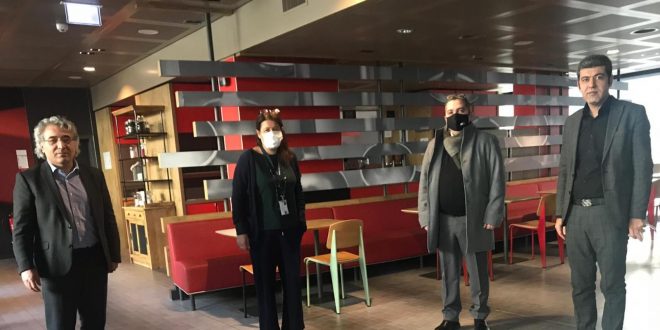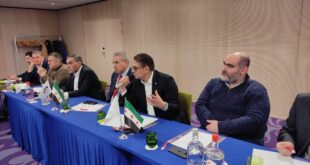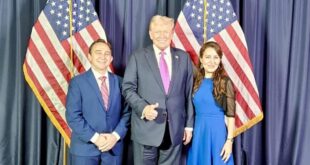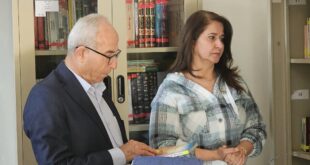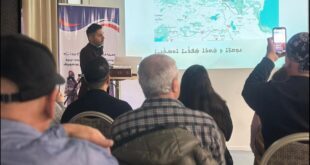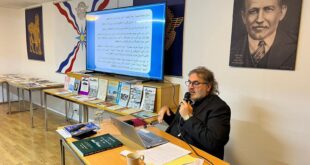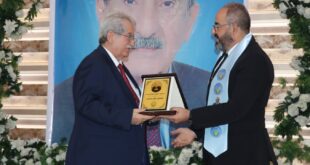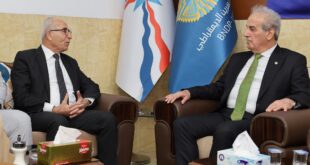01-02-2021
English/ Arabic
واكب فريق الدعم الاستشاري لممثلي المكونات الكردية والسريانية الآشورية والإيزيدية اجتماعات اللجنة الدستورية التي انعقدت اجتماعات دورتها الخامسة في جنيف بين يومي 25 و29 كانون الثاني 2021.
وفي اتصال مع المهندس كرم دولي عضو المكتب التنفيذي للمنظمة الآثورية الديمقراطية، الذي شارك في هذه الجولة تحدث ل Ado News عن الهدف من تشكيل فريق الدعم الاستشاري وعن الهدف من مواكبة اجتماعات اللجنة الدستورية قائلا:” تم تشكيل الفريق من قبل المركز الأوروبي للدراسات الكردية وبدعم من الاتحاد الاوروبي من اجل تقديم الاستشارات لممثلي الاقليات في اللجنة الدستورية ودعم مطالبهم في الدستور وذلك نتيجة ضعف تمثيلهم في اللجنة الدستورية وخاصة اللجنة المصغرة عن ثلثي المعارضة والمجتمع المدني حيث يغيب تمثيل السريان الآشوريين والإيزيديين ويقتصر تمثيل الكرد على عضو واحد.”.
وحول أهم النشاطات التي قام بها الفريق خلال تواجده بجنيف، أشار دولي الى أنهم بالإضافة للاستشارات السياسية والقانونية فإن اعضاء الفريق يجرون لقاءات مع العديد من البعثات الدبلوماسية الدولية والعديد من أعضاء اللجنة الدستورية من ثلثي المعارضة والمجتمع المدني وذلك لشرح رؤيتهم السياسية وتوضيح موقفهم من العديد من المبادئ الدستورية خاصة تلك المتعلقة ببعض الموضوعات التي لم يتم التوافق عليها بعد ضمن أطر المعارضة، كاسم الدولة وموقع الدين من التشريع ومبدأ المواطنة الكاملة والمتساوية واللامركزية الموسعة ومرتكزات الهوية الوطنية السورية المنشودة. وأضاف:” انطلاقا من فهمنا لتعبير ” دولة المواطنة” بأنه المرادف الموضوعي لـ ” دولة كل المواطنين” فإن إلحاق اسم الدولة او دين رئيسها باية صفة قومية او دينة او ايديولوجية وأيضا فإن سن أي تشريع يتناقض مع الشرعة الدولية لحقوق الانسان يمثل انتهاكا واضحا لمبدأ المواطنة الكاملة والمتساوية.
سياسيا، ذكر الرفيق كرم بأنهم شددوا في لقاءاتهم مع البعثات الدبلوماسية على أهمية أن تنهض الدول وخاصة في المجموعة المصغرة بدور أكثر فاعلية لتحقيق الانتقال السياسي وفق مضمون القرار 2254 وبأن استمرار هذا النظام في استهتاره وتملصه بدون أي رقيب او حسيب يمثل خطرا ليس فقط على السوريين بل سيعني سقوط كل قيم العدالة والحرية وحقوق الإنسان ويهدد بانتعاش المزيد من التطرف والإرهاب ومسوغا للنظام وأمثاله من ارتكاب المزيد من الجرائم والانتهاكات وربما المزيد المزيد من موجات المهجرين واللاجئين. كما شددنا على اهمية عدم الاعتراف بشرعية الانتخابات الرئاسية التي ينوي النظام إجرائها في حزيران المقبل.
وحول مدى الاستجابة التي لاقتها الرؤية المقدمة من قبل اعضاء الفريق خلال اللقاءات، أوضح الرفيق كرم دولي بأن ممثلي الدول الذين التقيناهم من الولايات المتحدة وبريطانية وفرنسا وكندا وهولندة والدانمارك وأيطالية والاتحاد الاوروبي كانت لديهم مواقف متطابقة وعبر الكثير منهم عن أن معظم هذه الموضوعات باتت في عداد البديهيات في دساتيرهم ولم يعد أحد يناقشها. أما بالنسبة لأطر المعارضة من مكونات هيئة التفاوض فلا تزال هناك آراء متباينة حولها وتحتاج الى المزيد من الحوارات وضبط المفاهيم وتثبيت معايير واضحة لتبنيها عدا أنها لا تمثل اليوم أولوية للعديد من اعضاء ثلث المجتمع المدني الذين يركزون على أولوية التاسيس في الدستور الجديد للنظام الديمقراطي وتحديد صلاحيات وولاية الرئيس وفصل السلطات واستقلال القضاء وحرية الرأي، خاصة في هذه المرحلة التي لايزال وفد النظام يعرقل تحقيق أي تقدم في عمل اللجنة ويتهرب من الخوض في اي صياغات او نصوص دستورية في محالة لتمييع العملية والتنصل من استحقاقات القرار الدولي 2254.
واضاف: لكن رغم استمرار وجود تبايانات حول بعض المبادئ إلا أن ذلك لم يمنع ثلث المعارضة من بلورة رؤية عامة حول المبادئ الدستورية تستند الى عدد كبير من المبادئ التي تجمع عليها أطراف المعارضة سعيا منه لتحقيق تقدم في هذا المسار.
وجوابا على سؤالنا فيما إذا كانت هناك فرصة للتعبير عن الحقوق والمطالب القومية للسريان الآشوريين والكرد والإيزيديين في هذه الجلسات، ذكر الاستاذ كرم دولي بأن الاستاذ كاميران حاجو عضو مكتب العلاقات الخارجية في المجلس الوطني الكردي قدم مداخلتين هامتين ضمن سياق رده على بعض المداخلات من قبل أعضاء من وفد النظام حول اعتبار العروبة إطارا واحدا موحدا للهوية الوطنية السوري، أكد خلالها على أهمية أن تنهل الهوية الوطنية من حالة التنوع القومي والديني والحضاري التي يزخر بها المجتمع السوري وأهمية أن ينعكس ذلك في الإعلام والتعليم وفي الرموز السيادية للدولة، وأشار الى ما تعرض له الكرد والسريان الاشوريين والتركمان من حرمان وانتهاك لأبسط حقوقهم الثقافية باسم العروبة بوجهها البعثي الإقصائي و شدّد على أهمية نيل القوميات غير العربية حقوقها القومية والثقافية والسياسية على قدم المساواة مع بقية السوريين وفي رده على بعض من اعتبر بأن السريان الآشوريين تمتعوا بحقوق ثقافية ولغوية قدم الاستاذ حاجو مداخلة عن واقع التعليم السرياني بين خلالها بأنه لم يكن سوى تعليما للغة طقسية كنسية وفي سياق الحريات الدينية وليست كلغة قومية وبانها لا تتلقى أي دعم او تمويل حكومي عدا عن اقتصارها على من يتمكن من تسديد تكاليف المدارس الخاصة.
وفي الختام أوضح الرفيق كرم دولي بأنه على الرغم من عدم تحقيق أي تقدم في مسار العملية السياسية، فإنه على قوى المعارضة السورية أن لا تضع كل بيضها في سلة واحدة، بل أن تسعى لتطوير أدوات لعمل سياسي جاد وفاعل مبني على توافقات وطنية صلبة يعكس تطلعات السوريين في بناء دولة ديمقراطية عصرية.
أما بالنسبة لحقوقنا القومية كسريان آشوريين في سوريا، اضاف الرفيق كرم دولي : نحن نعمل بجد لتقديم رؤيتنا وتطلعاتنا لمختلف القوى السياسية، انطلاقا من فهمنا لطبيعة دولة المواطنة التي ننشد، لكننا مازلنا بحاجة الى المزيد من العمل الدؤوب للتعريف بقضيتنا وحقوقنا والأهم دوما بتقديم خطاب وطني يتوخى الموضوعية والانسجام مع المعايير القانونية، ويستند الى رؤية سياسية واضحة، مع أهمية توسيع دائرة الأصدقاء والمناصرين، الأمر الذي تمس الحاجة معه الى المزيد من التنسيق وتكامل الجهود بين مختلف قوى ومؤسسات شعبنا في الوطن والمهجر وحشد كل الطاقات الفردية والجماعية لتثبيت حقوقنا كشركاء مع بقية أهلنا السوريين وضمان مستقبل أفضل لأبنائنا واحفادنا من بعدنا.
ADO News Release
ADO Continue Participation in the Constitutional Committee in Geneve.
The advisory support team representatives of the Kurdish, Syriac-Assyrian and Yazidi participated in the fifth round of the Constitutional Committee CC, held in Geneva between 25 and 29 January 2021.
In contact with Eng. Karam Dawli, member of the Executive Office of the Assyrian Democratic Organization, who participated in this session; he spoke to ADO News about the goal of forming the Advisory Support Team AST and about the goal of keeping pace with the meetings of the CC, saying: “The team was formed by the European Center for Kurdish Studies with the support of the European Union in order to provide advice to representatives of minorities in the CC and to support their demands in the new constitution, due to their unfair representation in the CC, especially in the Mini-Committee MC that constitutes two-thirds of the opposition and civil society in the CC, where the representation of the Assyrians and Yazidis is absent and the Kurds have a single member”.
Mr. Dawli elaborated on the most important activities carried out by the team during its presence in Geneva, he indicated that, in addition to political and legal consultations, the team members held meetings with several international diplomatic missions and several members of the CC ( of two-thirds of the opposition and civil society), in order to explain their political vision and clarify their position on many principles of the Constitution, especially those related to issues that have not yet been agreed upon within the frameworks of the opposition, such as the name of the state, the position of religion in the legislation, the principle of full and equal citizenship, expanded decentralization, and the anticipated foundations of the Syrian national identity. He added, “Based on our understanding of the term” the “state of citizenship” is synonym with “the state of all citizens.” The attachment of the name of the state or the religion of its president to any national, religious or ideological characteristic or the enactment of any legislation that contradicts the international bill of human rights represents a clear violation of the principle of full and equal citizenship.
Politically, Mr. Dawli mentioned that they stressed in their meetings with diplomatic missions the importance of the international community, especially in the small group, to play a more effective role to achieve political transition in accordance with the content of UN Resolution 2254. And that, the continuation of the regime in ignoring and evading UN Resolution 2254 , without any monitoring or accountability, represents a danger not only to Syrians, but it would mean the downfall of all human values of justice, freedom and human rights and threaten to revive more extremism, terrorism and justify the regime to commit more and bigger crimes and violations that would result in additional waves of displaced people and refugees. We also stressed the importance of not recognizing the legitimacy of the presidential elections that the regime intends to hold next June.
As far as, the response received by the vision presented by the AST members during the meetings, Mr. Karam Dawli explained that the representatives of the countries of the United States, Britain, France, Canada, the Netherlands, Denmark, Italy and the European Union had identical positions, and many of them expressed that most of these issues are obvious and universal and have become principal articles in their own constitutions.
As for the opposition groups of the negotiating body, there are opposing views and it need more dialogues, precise description of concepts, check and balances, to be adopted. All these concepts and principles do not represent, today, a priority for many members of one third of civil society who focus on the priority of establishing the new constitution for the democratic system and defining the powers and mandate of the president, the separation of powers, the independence of the judiciary system and the freedom of opinion, especially at the time when the regime’s delegation is still obstructing the achievement of any progress in the work of the CC and refuses to accepts any constitutional formulations or texts in an attempt to dilute the process and oppose UN Resolution 2254.
Mr. Dawli added: despite opposing views regarding some principles, this did not prevent a third of the opposition from crystallizing a general vision on constitutional articles based on a large number of principles on which the opposition parties unanimously seek to achieve progress in this path.
In response to our question about whether there is an opportunity to express the national rights and demands of the Assyrians, Kurds and Yazidis in these sessions, Mr. Dawli mentioned that Mr. Kamiran Hajo, a member of the External Relations Office of the Kurdish National Council, made two important comments within the context of his response to some of the members of the regime’s delegation regarding considering Arabism a unifying framework for the Syrian national identity. He stressed the importance of national identity ought to be drawn from national, religious and civilizational diversity of the Syrian society and its history, and it is necessary to be reflected in the media, education and the sovereign symbols of the state. Whoever deprives and violates the basic cultural rights, of non-Arab Syrian citizens, Kurd, Assyrians Yazidis and Turcoman, in the name of Arabism with its chauvinistic Baathist face is a violation of basic rights of none Arabs, and he stresses the importance of non-Arab nationalities obtaining their national, cultural and political rights on an equal footing with the rest of the Syrians.
In his response to some of those who considered that the Assyrians had enjoyed cultural and linguistic rights, Mr. Hajo elaborated on the reality of Syriac education, in which he explained that it was nothing but a teaching of a church liturgical language and part of religious freedom and not as a national language and that it does not receive any support or government funding and it is limited to who can afford pay the costs of private schools. In conclusion, Mr. Dawli explained that despite the lack of progress in the political process, the Syrian opposition forces must not put all their eggs in one basket, but rather, seek to develop tools for serious and effective political action based on solid national consensus that reflects the aspirations of all Syrians In building a modern democratic state.
As for our national rights as Assyrians in Syria, Mr. Dawli added: We are working hard to present our vision and aspirations to the various political groups, based on our understanding of the nature of the state of citizenship that we seek, but we still need more diligent work to define our cause and our rights and most importantly by presenting a patriotic stance based on objective values and agreement with legal standards based on a clear political vision, with the importance of expanding the circle of friends and supporters, which urgently needs more coordination and integration of efforts between various forces and institutions of our people in the homeland and Diaspora, and to mobilize all individual and collective energies to establish our rights as partners with the rest of the Syrians. And ensuring a better future for our children and grandchildren.
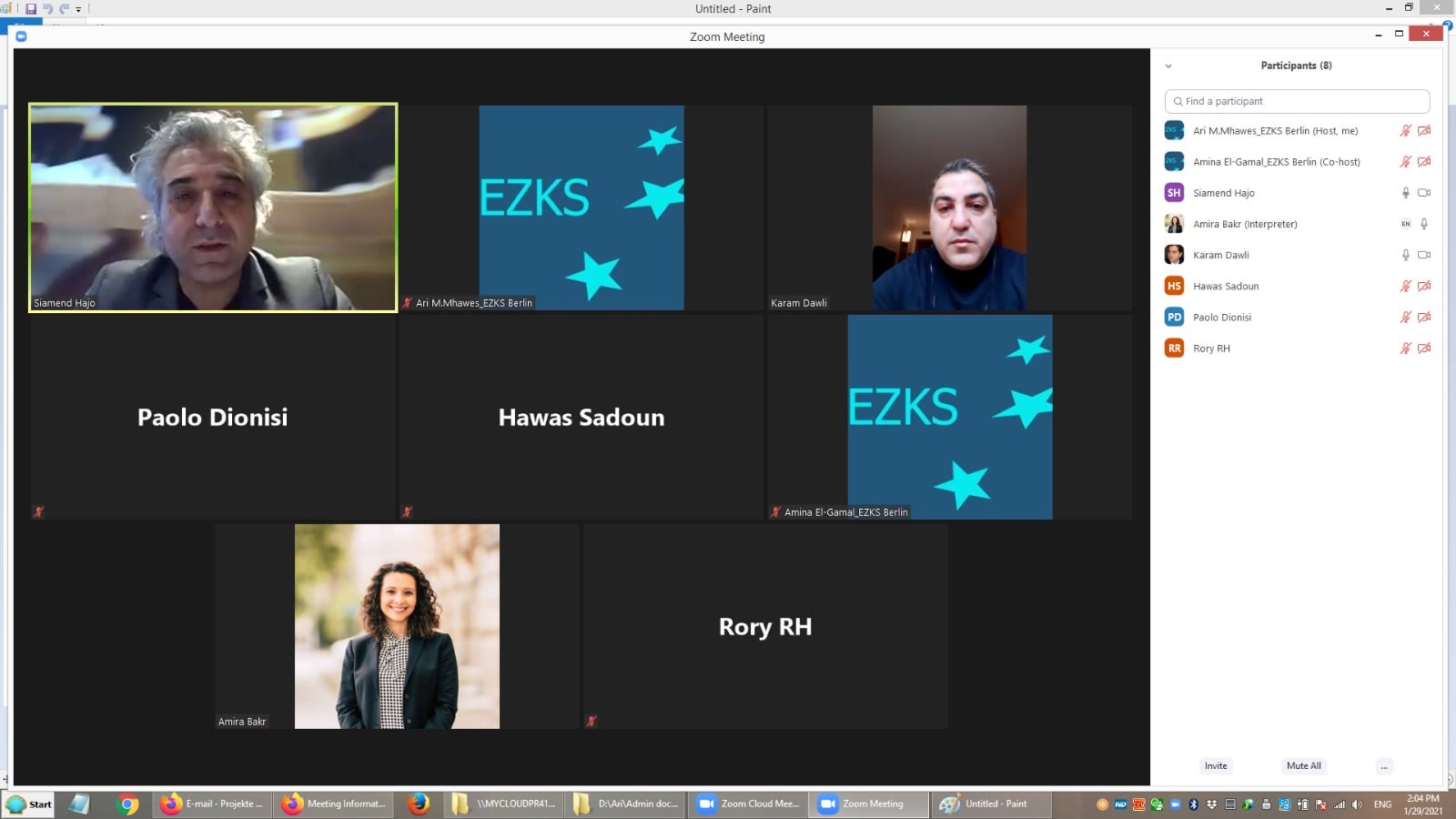
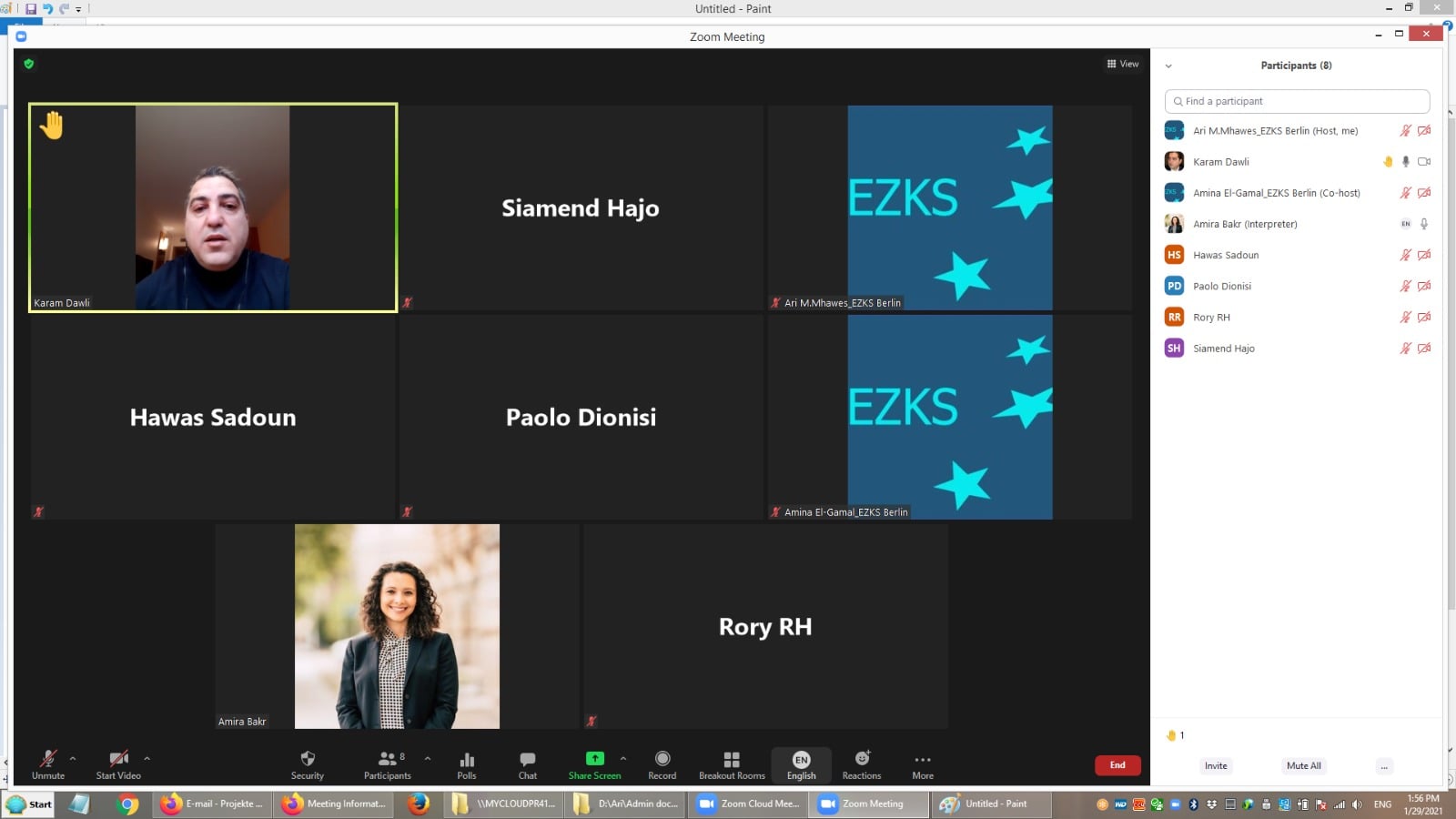
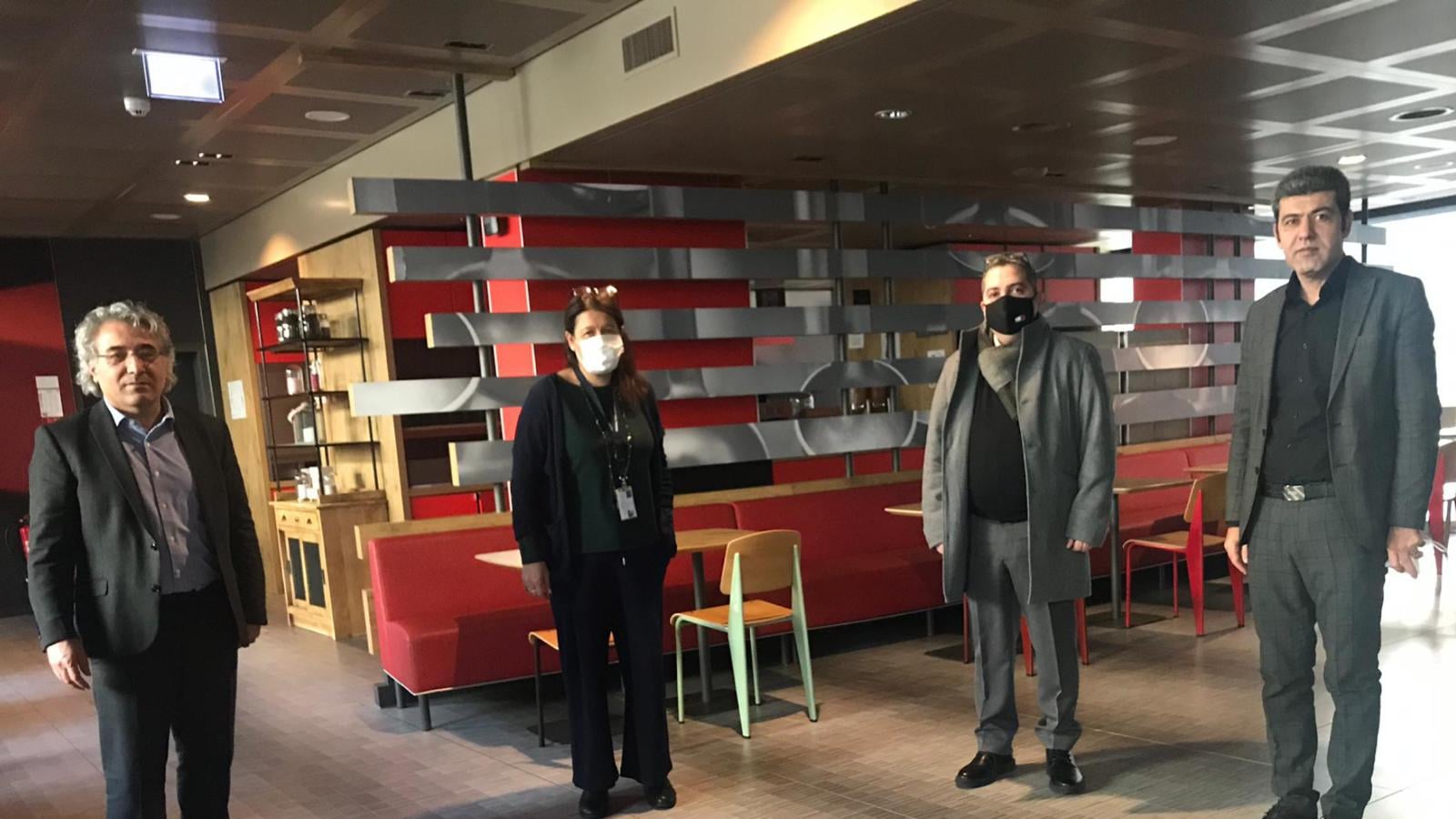
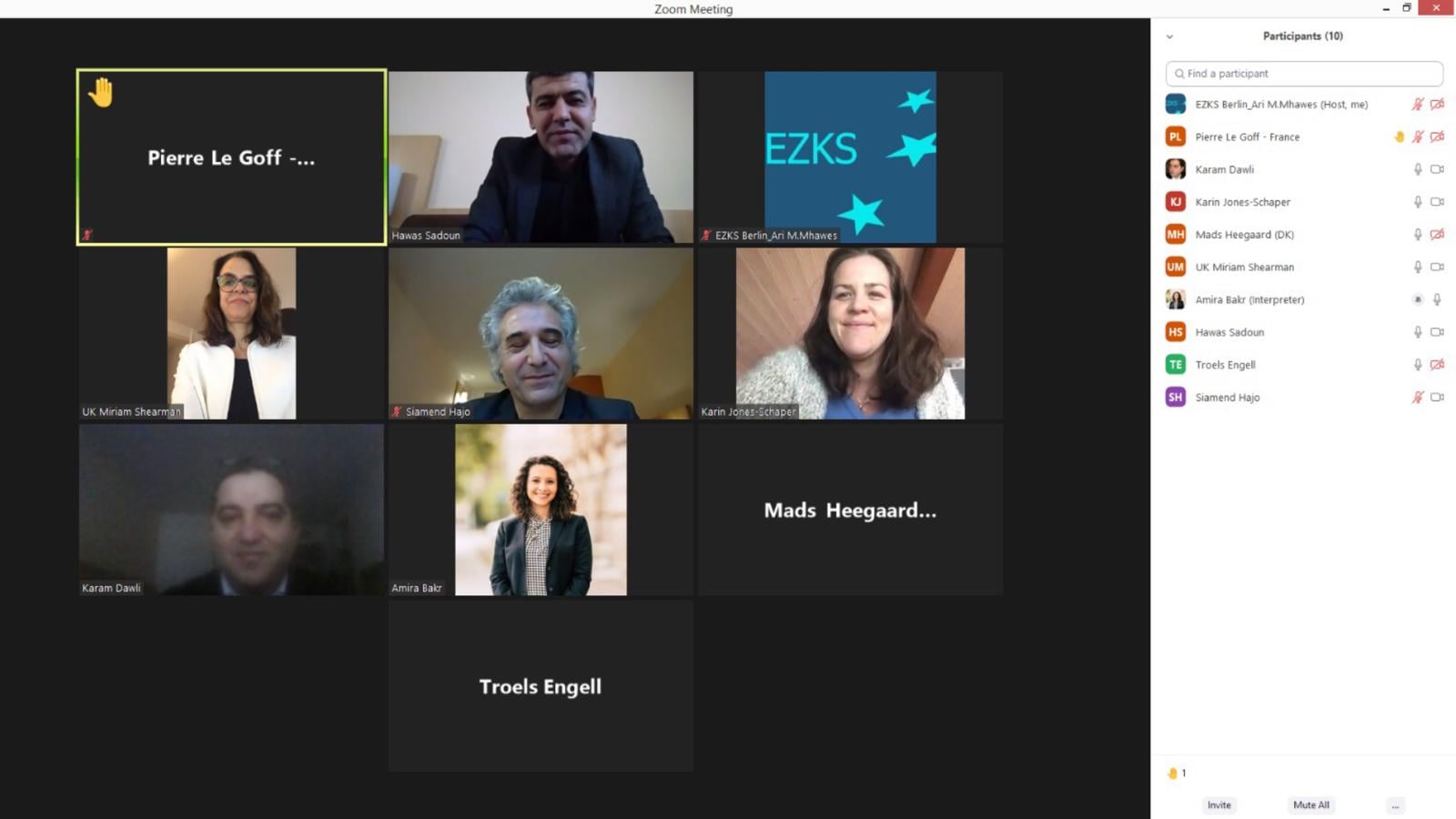
 المنظمة الآثورية الديمقراطية ADO
المنظمة الآثورية الديمقراطية ADO
